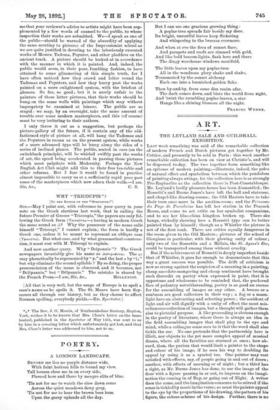WHY " TRICOUPIS " ?
[TO THE EDITOR OF THE " EPECTATOR."]
Siu,—May I point out, with reference to your query in your note on the Greek elections last week, that in calling the future Premier of Greece " Tricoupis," the papers are only fol- lowing the Greek form (Tamotl-znc—a having in modern Greek the same sound as i) ? Why the possessor of the name calls himself " Tricoupi," I cannot explain; the form is hardly a Greek one, unless it be meant to represent an oblique case (Tpoco4z-n). But what case, and by what grammatical construc- tion, it must rest with M. Tricoupi to explain.
And now another query. Why " Delyannis "? The Greek newspapers invariably give his name as ariXtylievion;. The yt may phonetically be represented by "y," and the last a by "i;" but why eliminate the second syllable ? By so doing, the proper pronunciation of the name is obscured, and it becomes, not " Dellyannis," but " D6lyannis." The mistake is shared by the French Press.—I am, Sir, &c., HELLENIST.
[All that is very well, but the usage of Europe is to spell a man's name as he spells it. The St. Maurs have been Sey- mours all through our history, but as they choose to affect Norman spelling, everybody yields.—En. Spectator.]






































 Previous page
Previous page